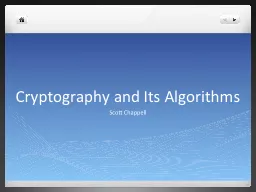PPT-Cryptography Jerry Cain
Author : pamella-moone | Published Date : 2019-11-07
Cryptography Jerry Cain CS 106AJ October 26 2018 slides courtesy of Eric Roberts Once upon a time Alan Turing Alan Turing 19121954 The film The Imitation Game
Presentation Embed Code
Download Presentation
Download Presentation The PPT/PDF document "Cryptography Jerry Cain" is the property of its rightful owner. Permission is granted to download and print the materials on this website for personal, non-commercial use only, and to display it on your personal computer provided you do not modify the materials and that you retain all copyright notices contained in the materials. By downloading content from our website, you accept the terms of this agreement.
Cryptography Jerry Cain: Transcript
Download Rules Of Document
"Cryptography Jerry Cain"The content belongs to its owner. You may download and print it for personal use, without modification, and keep all copyright notices. By downloading, you agree to these terms.
Related Documents














